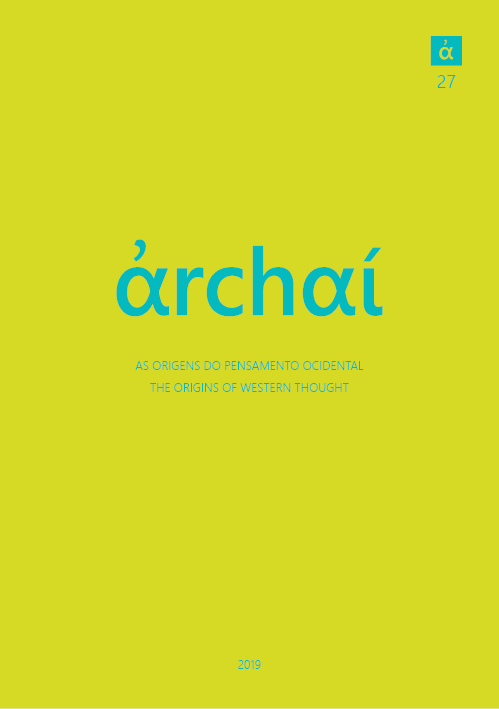The suspension of the sense of justice
Strategies and difficulties
Keywords:
Stoicism, sense of justice, punishment, revenge, intellectualismAbstract
The aim of the paper will be to analyze the different strategies that the Stoics of the Imperial times designed in order to put our sense of justice on hold, due to the fact that it is deemed responsible for certain attitudes which do not contribute to our search for eudaimonía. I will organize such strategies in two groups: the first one corresponds to the strategies that target the idea that an injustice has been committed; the second one corresponds to the ones that aim to show that there are more convenient attitudes towards injustice than the demand for punishment or the desire for revenge. I will end by pointing at the difficulty of reconciling both sets of strategies, and I will suggest a possible way to account for that difficulty.
Downloads
References
AYGON, J.-P. (2000). Le jeu des passions dans la Médée de Sénèque (v. 893-971). Vita 160, p. 21-31.
BAUMARD, N. (2016). The Origins of Fairness: How Evolution Explains our Moral Nature. New York, Oxford University Press.
BOERI, M. D. (2004). Observaciones sobre el trasfondo socrático y aristotélico de la ética estoica. Ordia Prima 3, p. 107-146.
BRAICOVICH, R. S. (2012). El solipsismo y el papel de la divinidad en las reflexiones de Epicteto. Pensamiento 68, n. 255, p.153-161.
BRAICOVICH, R. S. (2017). Seneca’s Medea and De ira: justice and revenge. Journal of Ancient Philosophy 11, p.106-119.
COURTIL, J.-C. (2014). Torture in Seneca’s Philosophical Works: Between Justification and Condemnation. In: WILDBERGER, J.; COLISH, M. L. (eds.). Seneca Philosophus. Berlin, De Gruyter, p. 189-208.
FISKE, A. P.; RAI, T. S. (2015). Virtuous Violence: Hurting and Killing to Create, Sustain, End, and Honor Social Relationships. Cambridge, Cambridge University Press.
FREDE, D. (2002). Theodicy and Providential Care in Stoicism. In: FREDE, D.; LAKS, A. (eds.). Traditions of Theology: Studies in Hellenistic Theology: Its Background and Aftermath. Leiden, Brill, p. 85-117.
HARRIS, W. V. (2001). Restraining Rage: The Ideology of Anger Control in Classical Antiquity. Cambridge, Harvard University Press.
INWOOD, B. (1985). Ethics and Human Action in Early Stoicism. Oxford, Clarendon Press.
LONG, A. A. (2006). Epictetus on understanding and managing emotions. In: Epicurus to Epictetus. Studies in Hellenistic and Roman Philosophy. Oxford, Clarendon Press, p. 377-394.
MONTELEONE, M. (2014). De ira. In: DAMSCHEN, G.; HEIL, A. (eds.). Brill’s Companion to Seneca. Philosopher and Dramatist. Leiden, Brill, p. 127-134.
NUSSBAUM, M. (1996). The Therapy of Desire. Theory and Praxis in Hellenistic Ethics. New Jersey, Princeton University Press.
REYDAMS-SCHILS, G. (2005). The Roman Stoics. Self, Responsibility, and Affection. Chicago, University of Chicago Press.
SALLES, R. (2006). Los estoicos y el problema de la libertad. México, Universidad Autónoma de México.
SORABJI, R. (1990). Perceptual content in the Stoics. Phronesis 35, p. 307-314.
STALEY, G. A. (2010). Seneca and the Idea of Tragedy. Oxford, Oxford University Press.
VOGT, K. M. (2006). Anger, Present Injustice and Future Revenge in Seneca’s De Ira. In: VOLK, K.; WILLIAMS, G. D. (eds.). Seeing Seneca Whole. Perspectives on Philosophy, Poetry and Politics. Leiden, Brill, p. 57-74.
Downloads
Published
How to Cite
Issue
Section
License
Given the public access policy of the journal, the use of the published texts is free, with the obligation of recognizing the original authorship and the first publication in this journal. The authors of the published contributions are entirely and exclusively responsible for their contents.
1. The authors authorize the publication of the article in this journal.
2. The authors guarantee that the contribution is original, and take full responsibility for its content in case of impugnation by third parties.
3. The authors guarantee that the contribution is not under evaluation in another journal.
4. The authors keep the copyright and convey to the journal the right of first publication, the work being licensed under a Creative Commons Attribution License-BY.
5. The authors are allowed and stimulated to publicize and distribute their work on-line after the publication in the journal.
6. The authors of the approved works authorize the journal to distribute their content, after publication, for reproduction in content indexes, virtual libraries and similars.
7. The editors reserve the right to make adjustments to the text and to adequate the article to the editorial rules of the journal.



